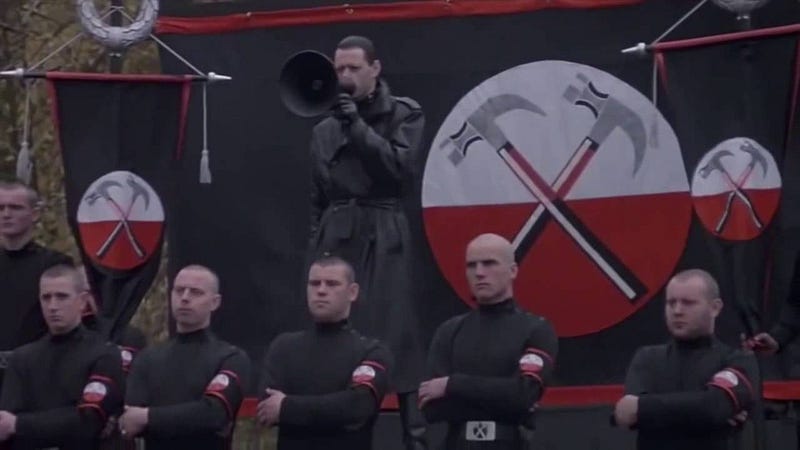Words Matter
I used to pick on language pedants. Certainly, I’m a stickler for grammar and spelling, but my militancy on that front has tended to be self-focused. Hijacking an interesting discussion about a larger topic by nitpicking the vagaries of someone’s language use always struck me as petty and stupid.
That said, there is power in language. When we use ‘illegal’ as a noun to describe a person, for instance. I noted yesterday the feeling I got when someone described another person as “a black.” Not “he’s black,” but “he’s a black.” That little article between two perfectly ordinary words opens a huge window into who it is that I’m talking to, their history and presumptions.
The same is true with ‘terrorist,’ or ‘patriot.’ Each of these words come fully loaded with assumptions of meaning that are very specific to the segment of our society with which we self-identify.
Some terms have had their meanings change over time by way of cultural combat. I proudly call myself a ‘nerd’ now, but 30 years ago, that same word had no other meaning but as a pejorative. Likewise with friends who refer to themselves as ‘queer,’ a term with nothing but negative connotations in times past. The use of certain words best left unspoken by cracker-asses continues to be a hot potato as tonedeaf white people attempt to prove their post-racialism by using it as if its already been disarmed by hip-hop and made passé (I’m looking at you, Quentin Tarantino).
We fight over words all the time, insisting that something does not mean what someone else thinks it means. It’s the “no true Scotsman” fallacy, illustrated here:
Person A: “No Scotsman puts sugar on his porridge.”
Person B: “But my uncle Angus likes sugar with his porridge.”
Person A: “Ah yes, but no TRUE Scotsman puts sugar on his porridge.”
Our political discourse hinges very much on the definition of who the TRUE Americans are. For every issue espoused by one side as an American value, the other comes right back saying that no TRUE American really wants that. Thus the very word ‘American,’ originally just a designation of nationality, is transformed into an entire set of beliefs and principles that just happens to fit whatever our own personal beliefs and principles are. Anyone else cannot use that word to describe themselves, because they are not TRUE Americans.
I remember when I first heard the title Homeland Security, back in the early W years after 9/11. The word ‘Homeland’ came packed to the gills with cultural connotations that made me squirm, reeking of nativism and exclusion. This from a nation of immigrants, excepting of course my two Cherokee great-grandmothers, pauperized in their own homeland by newcomers until they married into the dominant, invasive society we now call native to this place. ‘Homeland’ is a verbal threat to today’s newcomers, letting them know that they are not TRUE Americans.
Words circumscribe everything. I ordered a pair of sunglasses online that I thought looked really good. Upon receiving them in the mail, I noticed on the invoice that it said “women’s sunglasses.” Involuntarily, my guts seized up. Would everyone but me know that I was walking around wearing women’s shades? They just looked like sunglasses to me, but that one little word put the nagging doubt into my head. I’m not one to put much stock into traditional notions of masculinity, but the truth is, I still haven’t decided whether I’m sending them back. Because of that one word.
Someone told me the other day that they believed in ‘traditional values.’ The conversation was not political, and it was a sort of side comment, but it was everything I could do not to violate my rule against hijacking discussions with language clarifications.
What the hell are ‘traditional values?’ Whose tradition? I once worked with Hasidim who thought nothing of arranging marriages for their young teenage kids. I know multi-generational Santeria adherents, and people who won’t let their children watch television because demons hide in the airwaves. When I hear ‘tradition,’ it’s in the voice of Tevye, insisting that his daughter will be dead to him if she marries outside the faith.
And yet, I know exactly what was being expressed in that conversation. When a middle-aged white man in Texas says ‘traditional values,’ he means conservative Protestant Christianity, augmented by gun-lust and Fountainhead-humping economics. I really didn’t need the clarification. But I object to him usurping the words ‘traditional values’ to only mean those things that they mean in this region, to his ethno-religious demographic. The debate required to set all this straight, however, would have taken hours, so I ditched it, as most of us do when it comes to language in daily interpersonal interaction.
And of course that’s how they get you. The less you question a word being co-opted by one agenda or another, the more it becomes the standard meaning, and bam, before you know it, any conversations using that word are automatically loaded.
So maybe I’ve been wrong on this. Perhaps the only way to keep language from being hijacked is to have those nitpicky conversations. To be that guy. Although do it enough, and people will probably go out of their way not to have conversations with you. Somehow we have to make sure that everyone knows how much words matter.
Until we all switch to communicating by emoji, anyway.




